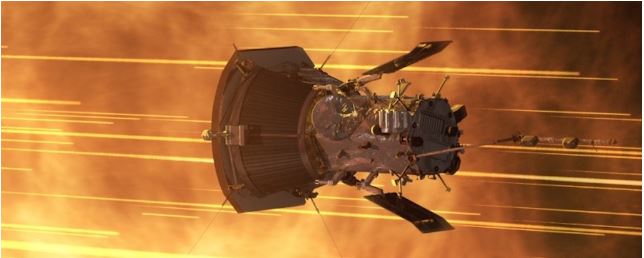


 2:13:30
2:13:30  2023-10-09
2023-10-09  1891
1891

Falling through the Solar System at an astonishing 635,266 kilometers (394,736 miles) per hour, NASA's Parker Solar Probe has just smashed the record for fastest object ever to be created by human hands.
The event on September 27 marks the turning point of the mission's 17th loop around the Sun as it collects data on the heated winds of charged particles and violent magnetism that surround our closest star, and comes just under three years after its previous record of 586,863.4 kilometers (364,660 miles) per hour. At these speeds, it'd be possible for an aircraft to circumnavigate our planet roughly 15 times in a single hour, or zoom from New York to Los Angeles in just over 20 seconds.
Not only is it a record speed, it's also a record proximity to the Sun - just 7.26 million kilometers above the radiant ocean of plasma we think of as the star's surface.
Given the Sun is just under 1.4 million kilometers across, this would be akin to standing several respectable paces away from a blazing campfire. Near enough to smell the smoke but not so close that your nose hairs singe.
Achieving such incredible feats wasn't the result of powerful propellants (at least, not entirely), but more a consequence of a perfectly-timed game of cosmic mini-golf.
For the Parker Solar Probe to get to right where the action is, it needs to slip in and out of the Sun's corona. Unfortunately we happen to be standing on a mobile launch pad that's hurtling through space at tens of thousands of kilometers per hour.
NASA used a beefy rocket to line up the shot and putt their heat-shielded ball down the celestial green at a speed intended to help cancel out Earth's orbiting velocity, and roll it right down the Solar System's throat.
Timing the probe's path with the creeping passage of Venus makes use of the planet's gravity, slowing the probe enough to circle the drain in a slowly- diminishing spiral.
After a total of 24 orbits, the Parker Solar Probe should finally tip over the brink and give the space agency a hole in one; but not before gathering a pile of information that will help us better model the Sun's behavior.
With another seven laps to go, we will no doubt see these records shattered again, each serving as a reminder of what can be accomplished with a little physics and a whole lot of curiosity.
Reality Of Islam |
|

As AI-power

MXenes are

A newly dev

Get ready f
 9:3:43
9:3:43
 2018-11-05
2018-11-05
10 benefits of Marriage in Islam
 7:5:22
7:5:22
 2019-04-08
2019-04-08
benefits of reciting surat yunus, hud &
 9:45:7
9:45:7
 2018-12-24
2018-12-24
advantages & disadvantages of divorce
 11:35:12
11:35:12
 2018-06-10
2018-06-10
 6:0:51
6:0:51
 2018-10-16
2018-10-16
 7:59:14
7:59:14
 2018-06-21
2018-06-21
 1:16:44
1:16:44
 2018-05-14
2018-05-14
 4:26:43
4:26:43
 2022-02-21
2022-02-21
 12:10:56
12:10:56
 2022-11-17
2022-11-17
 12:47:1
12:47:1
 2022-12-20
2022-12-20
 9:42:16
9:42:16
 2022-10-19
2022-10-19
 3:42:22
3:42:22
 2021-12-24
2021-12-24
 5:41:46
5:41:46
 2023-03-18
2023-03-18
| LATEST |